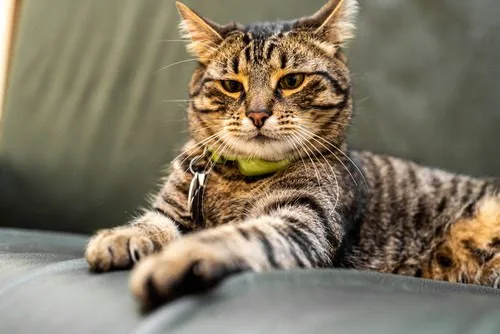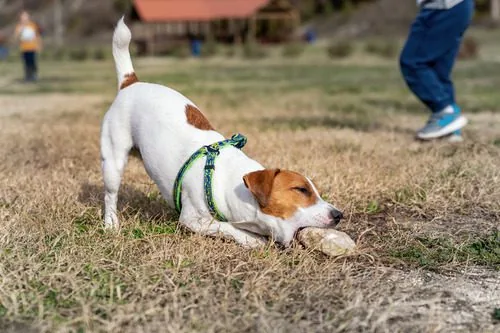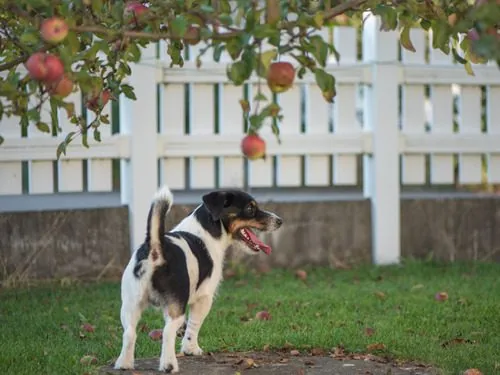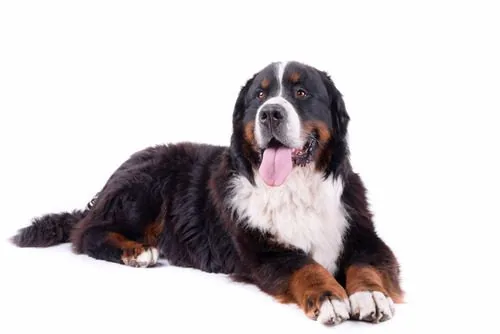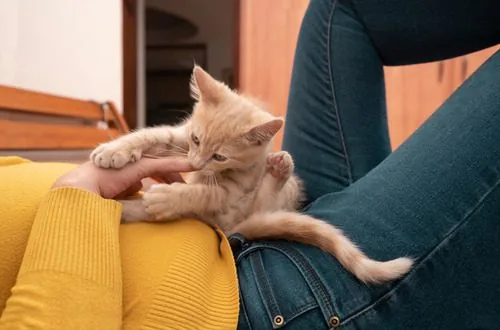Signs That Your Cat is Overweight
It can be very easy for a cat to become overweight. Unlike dogs, cats are not typically taken outside to go for walks and roam free in the backyard. Although cats are still active animals, it can be easy for them to become lazy, especially when their human friends are feeding them treats!
Just like people, weight gain can have a psychological effect on cats as well. Cats that become overweight may start to get mobility problems. Furthermore, it will be harder to do everyday tasks such as grooming and even getting up to eat or use the litterbox.
This lack of mobility and autonomy can cause our cats to become depressed, so we want to make sure we see the signs and address them as early as possible. So what exactly are the signs that your cat is overweight?
Signs that your cat is overweight include not being able to feel their ribs, spine, and shoulder bones, extra growth along their stomach pouch, waistline, and tail base, and not being able to move around and groom themselves properly.
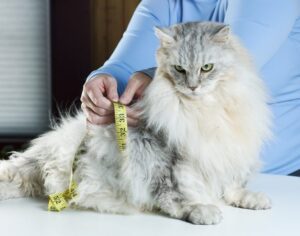
You Can’t Feel Their Ribs
One sign of cats becoming overweight is that you can’t feel their ribs. Although most people associate feeling and seeing ribs as a sign of a malnourished animal, you should be able to feel all of your cat’s ribs.
Most veterinarians will say that owners should feel (not press; just feel) the outline of their cat’s entire rib cage while the cat is standing. Other than lightly feeling the cat’s rib cage, an owner can also run their hand along the shoulders, spine, and hips to test if their cat is at the proper weight. While protruding and pointy bones indicate an underweight cat, a difficulty to feel bones along the ribs, shoulders, spine, and hips indicates that your cat is overweight.
Waistline Growth
Another tell-tale sign of an overweight cat is their waistline. If the owner sees a waist just above the hips, the cat is probably at an ideal weight. If there is no waist or the waist is wider than the hips, the cat may need to lose a few pounds.
Just like humans, cats can get “love handles” around their waist. If you notice this on your cat, they may be overweight.
Check the Base of the Tail
Still another way can be feeling a cat’s tail. If the bones in the tail can’t be felt near the base, or it takes a lot of effort to feel the bones, the cat may be at least a little fat.
Extra Fat on the Stomach Pouch
Cats have something called a primordial pouch in between their back legs. When cats fight, they tend to kick their back legs, leaving their stomach exposed. This pouch helps to protect their exposed stomachs.
However, these pouches might also indicate overweightness or obesity. While it is normal for a cat’s pouch to hang just below their tummy, any extra overhang in the pouch might be a cause for concern.
If the pouch feels “meaty” or “fatty”, it is a sign that your cat may be overweight.
Struggling to Move Around
A major sign of weight gain in cats is if a cat is struggling with regular activities such as jumping and playing. This is especially concerning if the cat traditionally did these activities with ease, but now doesn’t do them often or cannot do them at all.
Other issues overweight cats may have are trouble grooming, eating, or using the litterbox. In other words, if a cat suddenly stops doing their normal activities, weight gain may be to blame.
How to Help Your Cat
As cat parents, there is nothing more that we want than to help our furry friends live a happy and healthy life. There are many things we can do to help our cats shed off a few pounds. Remember to always consult with your veterinarian before putting your cat on a diet or exercise regime!
Diet
In some cases, a change of diet may be all that your cat needs to reverse their weight gain.
Although our cats love treats, most cat owners are overfeeding their cats treats without even realizing it. As a rule of thumb, a cat’s daily treat intake should make up only 5% to 10% of their daily caloric intake.
Furthermore, check that you are giving your cat the proper food. Many cat owners continue to feed their cats kitten food long after their cats have moved into adulthood. This can cause extra weight gain in cats as kitten food is very high in protein compared to cat food.
Exercise
Although it may seem hard to exercise our cats, we need to remember that cats desperately need it just as much as other animals!
Simple changes, such as playing with and interacting with your cat for 20 to 30 minutes of day can give them the exercise they need to be more healthy. Some cat owners even walk their cats outside, with the proper collar and leash of course!
Often times our cats get bored easily, which can result in a lack of physical activity. To keep your cat entertained and active, find some interactive toys that your cat can play with.
There are many interactive cat toys on Chewy and Amazon that will keep your cat active and engaged!
See a Veterinary Professional
Sometimes, weight gain in cats may be a tell-tale sign of something more serious. Sudden weight gain in your cat may be caused by diseases or an underlying health condition. Furthermore, your cat being overweight can lead to more issues down the road such as diabetes, hypertension, organ failure, and more.
It is best to see your vet when you have questions about weight gain in your cat.
Conclusion
Although there is a plethora of information on the internet, it is best to let a veterinary professional see your cat if you have concerns about their weight.
Veterinarians and their staff are seasoned professionals when it comes to diagnosing an overweight cat. They also have the tools and knowledge to get your cat back on track to a healthy lifestyle through diet, exercise, and other means.
For concerned cat parents in the Terre Haute, IN area, Brown Veterinary Hospital is here at for any questions! Visit our nutritional counseling page for more information on how we can help.
Recent Posts
About Brown Veterinary Hospital
We are here to serve as your partner in keeping your four-legged family member healthy, ensuring you have all the tools you need to provide them with a lifetime of outstanding care. Our animal hospital in Terre Haute offers a full range of services to nurture and extend your pet’s life, from wellness and preventative care to critical care, exotic pet care, and dermatology.

